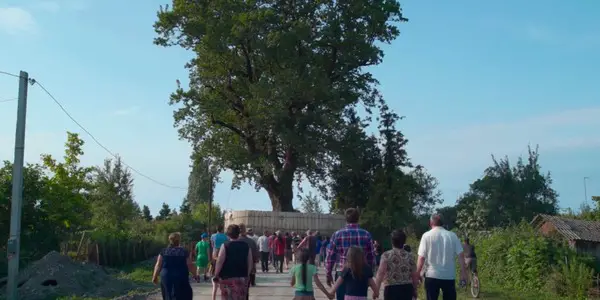TAMING THE GARDEN: Bending the World To Your Whims

Soham Gadre is a writer/filmmaker in the Washington D.C. area.…
A man climbs down an electrical tower in the dense fog. Below him, another man is hooking his fishing rod up next to a small pond right near a large industrial zone. What Salomé Jashi’s patient documentary Taming the Garden doesn’t quite say in words, it tries to suggest in very deliberate imagery. Several critics have already mentioned that the film reminds them of Werner Herzog, in no small part because it also deals directly with one man’s megalomania and the process of exploiting labor and destroying property to move a gigantic object a long distance – two characteristics of Fitzcarraldo (1982).

There isn’t much in common here stylistically with Herzog though, especially his documentaries. Jashi is noninvasive in his questioning. In fact, the movie doesn’t really pose many questions at all. It instead tries to elicit questions from the viewer.
A Collector’s Obsession
Former Georgian Prime Minister Bidzina Ivanishvili is a billionaire and like a lot of billionaires, he believes he can buy anything. So he collects century-old trees to put in his own private garden, called the Shekvetili Dendrological Park, surrounding his estate. Taming the Garden takes a close procedural look at the extraction and transportation of one of these trees. The tree that has been selected belongs to a 90-year-old rural woman who lives a meager existence. When asked what her money demand is for the tree she says 400 to which Ivanishvili’s lawyers assume 400,000. The disparity in understanding the “amount” and “scope” of money defines how the importance and size of things come to focus in the movie.
Images of Obscene Wealth
The tree is gigantic, moving it is an entire ordeal, and it affects nearly everything surrounding it on its journey – the community as well as natural order and infrastructure. One terrifying shot takes place at night when two trucks carry the tree behind them. It glows green in a pitch-black night, like a phantom obelisk making its way from the abyss. Trees alongside the road have to be chopped down to make room for this behemoth. Powerlines have to be cut, disrupting the lives of an entire community of people. The rich and powerful can bend society to their whim. They see vast land, large populations, and gigantic creations of nature as small things. They must hold them, contain them, tame them. This is why 400 to the old woman is assumed as 400,000 to the megalomaniac.

“He can do whatever he wants with his money. He’s building a road, at least he’s doing something!” exclaims one of the community members. Others cry because of the environmental destruction. Jashi maintains a formal distance from the subjects and that can become frustrating in a documentary in which the images suggest a lot is at stake. His camera’s focus on the technical elements and labor minutiae of the tree’s removal are intercut with some ominous sequences in the dark where the lighting on the tree branches feel like something out of a supernatural horror film. Jashi blends lines between artistic curation of imagery and real-life documentation. A scene where the tree glides on the back of the trucks down a suburban street and a group of people follow it feels like a modernist/absurdist biblical painting.
Conclusion
Taming the Garden is a consciously composed documentary that tries to communicate through observation. Perhaps its images don’t speak loud enough to be obvious, but that leaves it open to diverse excavations of what is going on. It’s an eye-catching watch and one that leaves its images in mind as reminders of how the rich can bend the structures of anything, even nature, to their whim.
Taming the Garden is streaming currently on MUBI for US audiences.
Watch Taming the Garden
Does content like this matter to you?
Become a Member and support film journalism. Unlock access to all of Film Inquiry`s great articles. Join a community of like-minded readers who are passionate about cinema - get access to our private members Network, give back to independent filmmakers, and more.
Soham Gadre is a writer/filmmaker in the Washington D.C. area. He has written for Hyperallergic, MUBI Notebook, Popula, Vague Visages, and Bustle among others. He also works full-time for an environmental non-profit and is a screener for the Environmental Film Festival. Outside of film, he is a Chicago Bulls fan and frequenter of gastropubs.













